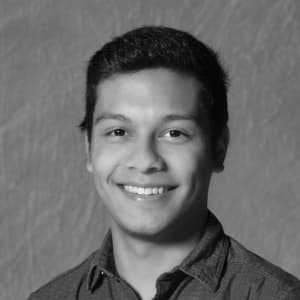Multigenerational Nursing: A Filipino American Nursing Experience

Growing up, Francesco and Mario Grupico recall their mother, Vivian, working several jobs as a registered nurse (RN). Vivian took as many as three jobs to support the family after their father was injured at work.
Her primary place of work was with a hospital, but at times in her career, Vivian also worked as a home health nurse and a nursing teacher.
“This had a major impact on me to be able to see my mom work multiple jobs as a nurse and care for the family,” Mario, Vivian’s youngest son, recalls.
While a primary goal of Vivian’s hard work was to financially provide for her family, Mario knew she was “making a difference in the world.”
Vivian emigrated from the Philippines in 1991 for a better quality of life. Nurses who immigrated to the United States play an essential role in the U.S. healthcare system. In 2018, immigrants from the Philippines made up 28% of the 512,000 nurse immigrants working as registered nurses.
Vivian encouraged her sons, Mario and Francesco, to become nurses as well. Vivian, Francesco, and Mario understand the difficulties and challenges they share as nurses.
Similar to other multigenerational nurse families, they are part of a tight-knit club where bonding over nursing is the norm. They support each other and know that anything is possible through hard work, empathy, and passion.
This is our third series on multigenerational nursing. We’ve interviewed nurses who emigrated from India and from Haiti to the U.S. and their children who followed in their nursing footsteps. Their stories encompass themes of grit, the financial security found in nursing, and a passion for caring for others. Vivian’s story is no different.
The Start of a Nursing Tradition: From the Philippines to the U.S.
Though she has been a nurse for more than three decades, Vivian was not always pursuing nursing. Vivian’s first degree is in engineering. After immigrating to the U.S., however, she began working as a nursing assistant and then as an RN at Deborah Heart and Lung Center.
“My parents encouraged me to pursue nursing because there were many jobs available,” Vivian recounts.
This sentiment still applies today. Nursing employment is projected to grow 9% in the next 10 years, higher than the average for other occupations. This growth is related to a growing aging population and the ongoing nursing shortage. The American Nurses Association reports that more than a million new nurses need to join the profession in the next few years to avoid a critical nursing shortage.
As an immigrant nurse, Vivian had to pass the Test of English as a Foreign Language, an exam that tests English proficiency, the Commission on Graduates of Foreign Nursing Schools test, which screens entry-level nurses licensed outside the United States, and the National Council Licensure Examination for RNs (NCLEX-RN).
If that wasn’t difficult enough, Vivian also had to feel confident speaking English. She recalls practicing her pronunciation in front of a mirror and using “Hooked on Phonics” to improve her English.
“I remembered having anxiety when answering a phone because some physicians speak so fast and with a different accent,” she says.
Vivian describes her career as a nurse as “fulfilling and a great profession.” Although she wanted her sons to become nurses, she allowed her oldest, Francesco, to choose his own path.
Passing Down the Nursing Tradition
At first, like many who grew up watching their parents working grueling hours with many jobs as nurses, Francesco resisted pursuing the same career.
“I did not want to be another Filipino nurse following the Filipino stereotype that all Filipinos are nurses,” Francesco says.
He entered college as a graphic design major but soon found out something many in nursing families discovered: Nursing was in his blood.
In college, he was quickly reminded that nursing was, in fact, more of a career he could relate to. His friends reminded him of his desire to care for others and be there for people in their time of need.
Nursing also brought Francesco opportunities that many professions don’t. While his mother chose to settle down in one area of the hospital and have a family, Francesco yearned for something different. At the peak of the COVID-19 pandemic, he decided to pursue travel nursing.
“I viewed travel nursing as an opportunity for me to finally reach my goal of traveling and potentially moving to California,” Francesco says. Travel nursing also gave him another purpose: teaching.
For Mario, he was sold on nursing since childhood. His mother’s role as a nurse had a major impact on him following in her footsteps. Nursing was in line with his values, too. He knew he wanted a career with frequent social interactions, one where he could make a difference in someone’s life, and most important, a flexible schedule.
“I knew it was a stable career to support a family, along with a schedule to be home at night if need be for my family,” Mario says.
Mario and Francesco agree that nursing school is stressful and requires sacrifice and dedication despite being a great profession. With a curriculum heavy on science classes and critical thinking for nurses, a nursing degree can be difficult for some students.
“My expectations of nursing being an easy career path were quickly proven incorrect in nursing school,” Francesco says.
He watched his mother work as a nurse for years, so he assumed it would be straightforward. He soon found out that wasn’t the case.
But Francesco and Mario persevered, and they thank their mother for it. Having a multigenerational nursing family offers invaluable support, empathy, and nursing mentorship from those who have taken the path before you.
Shared Experiences and Opposite Preferences
The Grupico family is full of many similarities and some particular differences.
Mario and Vivian both love being a nurse, but their relationship with technology within nursing couldn’t be more different. Mario is especially grateful for the advances in technology in the nursing world, such as pumps, computer documentation, and computerized medications and procedures.
But nursing 30 years ago when Vivian started isn’t what it is today. She remembers as an “old school nurse,” charting in red, blue, and green pens. She passed out and kept track of medication by writing it out on a patient’s card, did long-form math to calculate drug dosages, and counted the intravenous (IV) drip using her watch’s second hand.
Now nurses use very high-tech computers. Their charting is computerized. The IV drips are in the pumps, with the “accurate calculation programmed already,” she points out.
A similar experience Vivian, Mario, and Francesco all found was lasting friendships in nursing. This is something many nurses describe as one of the best parts of the profession.
“Spending twelve-hour shifts with people at work truly brings people together,” Francesco says.
Being a nurse is unique. Only other nurses can truly understand the responsibility that comes with the profession. But with it comes camaraderie and a built-in support network. Vivian is very grateful for her “Deborah Heart and Lung Center” family of 31 years.
When it comes to patient care and their personal life, nurses laugh and cry together. Friendships are also a way to improve your mental health in such a stressful environment.
“To this day, I made friends in my nursing program that I will be keeping for life,” Mario says.
Carving Out Their Path
Although Vivian has a degree in engineering, she finds fulfillment as a nurse. She loves helping and caring for her patients.
“Becoming their advocate gives me a sense of accomplishment and pride knowing that I am keeping them safe,” she says.
Vivian and her husband, Frank, are very proud of their sons, too. Both sons are cardiac critical care nurses. They were able to carve out their nursing careers with the support and guidance of their parents.
Mario continues to lean on his mother and older brother for guidance and advice regarding the experiences he faces as a nurse.
“I have been able to ask for support and help on what to do as they are both more seasoned nurses than me,” he says.
Francesco agrees. With a family of nurses (their aunts and cousins are nurses as well), Francesco has a built-in safety net where he can vent his frustrations about the job, and they can “build each other up and inform each other of new knowledge,” he says.
And with their own experiences, Mario and Francesco develop their own guidance and advice to pass along. Starting a new position as a new graduate nurse is nerve-racking, especially if you just moved from another country or started during a pandemic. But Francesco advises to “do it, and stick with it.”
He admits nursing is traumatizing at times but staying strong and supporting each other is key to your mental health and providing optimal care to patients.
Mario knows far too well the increase in stress nursing school causes. Starting his first nursing job in 2021, he is a recent graduate. His advice to nursing students is to take your time, make friends, and join study groups. Last but not least, “remember to have fun.”
Vivian lives by one motto as a nurse, and she believes other nurses should do the same: “If they can do it, I can do it.”
The nursing profession is full of opportunities. Today, nurses can create a career path they dream of. They have to have confidence, drive, and a solid support system.
Nursing doesn’t stop at the bedside. The pandemic proved that. Nursing remains a global, in-demand career, and the Grupico family can’t imagine doing anything else.
Meet Our Contributors

Vivian Grupico emigrated from the Philippines in 1991 and began working as a nursing assistant, then a registered nurse, at Deborah Heart and Lung Center. She is currently working in the pulmonary department. Grupico earned her nursing degree at Quezon City Medical Center.

Mario Grupico is a registered nurse working in the medical intensive care unit at Deborah Heart and Lung Center. Grupico earned a bachelor of science in nursing from Fairleigh Dickinson University. As a 2021 graduate, he began working at Deborah as a nurse. Beginning his nursing career during the pandemic was challenging, but he continues to bring passion and dedication to his patients every single day.

Francesco Grupico is currently a travel nurse working in California. He earned his bachelor of science in nursing from Holy Family University in Philadelphia, Pennsylvania. A 2018 graduate, he began his nursing career at Deborah Heart and Lung Center. During the pandemic, Grupico decided to begin travel nursing. When he returns home, he shares his experiences from working at hospitals across the country.